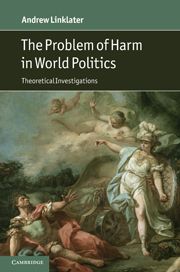Book contents
- Frontmatter
- Contents
- Preface
- Introduction
- 1 The concept of harm
- 2 The harm principle and global ethics
- 3 Harm and international relations theory
- 4 The sociology of civilizing processes
- 5 Historical sociology and world politics: structures, norms and emotions
- 6 Civilizing processes and international systems
- Conclusion
- Bibliography
- Index
6 - Civilizing processes and international systems
Published online by Cambridge University Press: 05 June 2012
- Frontmatter
- Contents
- Preface
- Introduction
- 1 The concept of harm
- 2 The harm principle and global ethics
- 3 Harm and international relations theory
- 4 The sociology of civilizing processes
- 5 Historical sociology and world politics: structures, norms and emotions
- 6 Civilizing processes and international systems
- Conclusion
- Bibliography
- Index
Summary
The final task is to integrate the main themes in the previous chapters by setting out the central questions for an analysis of global civilizing processes that integrates Wight's vision of the comparative investigation of states-systems with Eliasian process sociology. The questions are the prelude to an empirical inquiry into the nature and scope of cosmopolitan harm conventions in different international systems that will be the subject of future discussion. Part one considers Wight's distinctive approach to International Relations in which systems of states are the preferred level of analysis, an approach that is invaluable for efforts to build bridges with, and contribute to, process sociology. Part two turns to his conjectures about certain long-term patterns of development that may be common to all states-systems. They include, as noted earlier, the trend towards larger territorial concentrations of power, the elimination of small states, and struggles for power that result in the dominance of one power, at which point the system of states is replaced by a universal empire. Despite those realist conjectures, Wight's general thesis was that international societies have at least a temporary civilizing role. They have been domains in which many states have attempted to curb the power to inflict devastating harm; and, as the humanitarian laws of war reveal, there have been times when they have aimed not only to create order between states but to alleviate the suffering of people as moral subjects in their own right.
- Type
- Chapter
- Information
- The Problem of Harm in World PoliticsTheoretical Investigations, pp. 232 - 257Publisher: Cambridge University PressPrint publication year: 2011



